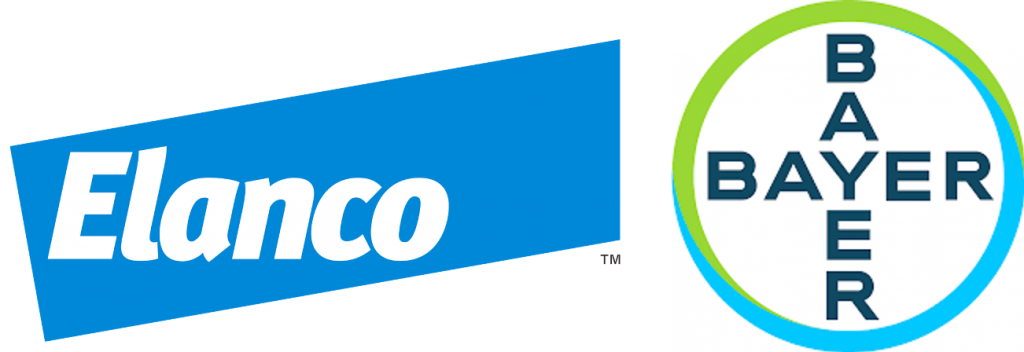 Pending approval, two of the world’s largest animal healthcare manufacturers will consummate a multibillion dollar acquisition in August 2020, subject to FTC and other, international competition authorities’ terms. Elanco Animal Health, Inc. and Bayer Animal Health, GmbH are both engaged in the global development, manufacture, and sale of animal pharmaceutical products used in agribusiness, and by veterinarians and pet owners.
Pending approval, two of the world’s largest animal healthcare manufacturers will consummate a multibillion dollar acquisition in August 2020, subject to FTC and other, international competition authorities’ terms. Elanco Animal Health, Inc. and Bayer Animal Health, GmbH are both engaged in the global development, manufacture, and sale of animal pharmaceutical products used in agribusiness, and by veterinarians and pet owners.
Elanco set out to purchase all of Germany-based Bayer Animal Health’s assets last August. In response, the FTC investigated the agreement’s prospective anticompetitive effects and issued a complaint on July 14, 2020, arguing that aspects of the acquisition would “substantially lessen competition and to tend to create [] monopol[ies]” in certain U.S. markets. The Commission collaborated with antitrust agencies in Australia, New Zealand, the United Kingdom, Canada, and the European Commission to analyze the transaction and create consistent remedies.
The FTC’s Proposed Consent Agreement
The FTC’s complaint honed in on three specific markets it found problematic. Its proposed Consent Agreement contains three corresponding divestitures, each requiring the companies to “transfer all supply input and other manufacturing contracts, business information, product approvals (including relevant FDA marketing authorizations), intellectual property, and other related assets to the relevant divestiture buyer.”
The first troublesome market was the “low-dose prescription treatments for canine otitis externa,” according to the proposed Consent Agreement. The condition causes outer ear inflammation from a bacterial or yeast infection in dogs. Although there are other treatments, the FTC focused on the fact that Elanco’s Osurnia and Bayer’s Claro “require only one or two doses to treat the condition.” Combining the two drugs’ market shares would create a monopoly for the low-dose prescription market, the Commission reasoned.
In turn, the FTC wants Elanco to divest Osurnia to Dechra, a publicly traded U.K.-based animal healthcare company that has operated in the United States for 15 years, selling over 80 prescription and non-prescription products. According to the proposed Consent Agreement, Elanco’s divestiture of Osurnia “will complement Dechra’s broad dermatology portfolio.”
The second problem area cited by the FTC was in the “fast-acting oral treatments that kill adult fleas on canines” market. The Commission noted that while other canine shampoos and sprays target fleas, most are prophylactic or slower-acting, targeting flea larvae rather than adult morphs, “Elanco’s Capstar and Bayer’s Advantus start killing adult fleas quickly [], and eliminate all adult fleas within four hours.” To remedy the resulting monopoly, the proposed Consent Agreement asks Elanco to sell Capstar to PetIQ, a rapidly growing pet health and wellness upstart headquartered in Boise, Idaho.
The third area of concern was the already concentrated “brand name cattle pour-on insecticides” market. These insecticides are liquid solutions applied to bovine skin to kill and prevent fly, lice, and mite infestation. Because customers rely on branded rather than generic versions of pour-on insecticides, the FTC found that the latter was not a realistic substitute for the former.
The FTC deemed Bayer the “market leader” for these particular products because it manufactures and sells three pour-on insecticides. According to the agency’s analysis, competitor Merck & Co., Inc., slides into second place, offering four such products, and Elanco claims third with its popular StandGuard.
The FTC also considered the fact that customers cycle insecticides to avoid pest resistance. As such, and because StandGuard and one of Bayer’s products, Cylence, contain similar chemical compounds, they “may compete for and occupy the same slot in cattle producers’ pour-on insecticide rotation.” In turn, the proposed acquisition would result in the third-largest market player absorbing the market leader’s share, with meaningful anticompetitive consequences.
To avoid this further market concentration, the FTC has asked that Elanco divest StandGuard to Neogen, a Michigan “global animal food and safety company.” The Commission found this to be a suitable remedy because Neogen already markets and sells products “through the same distribution channels Elanco uses for StandGuard,” and has the ability to “manufacture StandGuard in-house.”
International Responses
During its review of the Canadian market, the country’s Competition Bureau required Elanco sell Osurnia and Bayer to sell its feline de-wormer, Profender, according to its July 14, 2020 press release. It also required that Elanco forego acquiring Bayer’s Canadian distribution rights to several poultry insecticides.
The European Commission proposed similar terms, noting that its “investigation found that no competition concerns arise for the majority of the products” supplied by both companies, according to its June 8, 2020 press release. In addition to the requisite sale of Elanco’s Osurnia, the EC required Elanco to divest Vecoxan, a cattle and sheep pesticide, on a global scale, and for Bayer to shrug its Drontal and Profender pet parasiticide products within the European Union and the U.K.
According to Elanco’s July 15, 2020 press release, the value of its worldwide divestitures will cost it between $120 million to $140 million in annual revenue. The company, which operates in more than 90 countries around the globe, has reportedly received antitrust approval from Australia, Brazil, Canada, China, Colombia, New Zealand, South Africa, Turkey, Ukraine, and Vietnam.
Edited by Tom Hagy and Christina Tabacco, J.D. for MoginRubin LLP.
